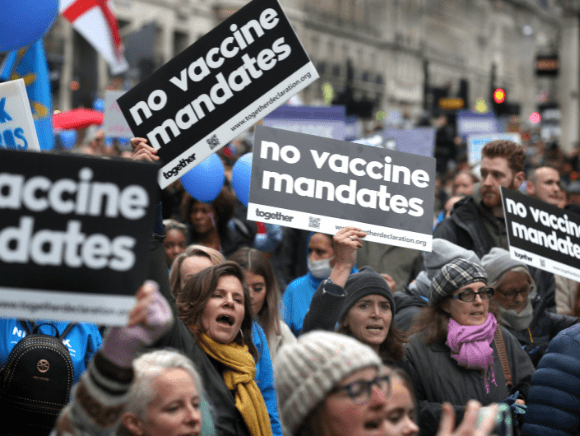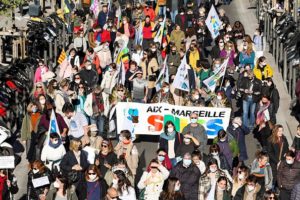The Omicron variant of COVID-19 has upset the nation, and the world, as leaders try to figure out what they think is best for their citizens. However, different countries are trying various tactics – and with varying results. Which countries are having the most success and what are their methods?
COVID and the United States
On Sunday, January 23, a large protest against vaccine mandates is scheduled to take place in Washington, D.C. Called “Defeat the Mandates American Homecoming” rally, dozens of activists and speakers are slated to meet at the Washington Monument at 10:30 a.m. A march to the Lincoln Memorial is scheduled to start at 11:30 a.m.
 Musical performances, as well as guest speakers, are among some of the activities. Robert F. Kennedy Jr., Paul Marik, and Robert Malone are some of the presenters expected to speak at the event. Up to 20,000 people are expected to attend.
Musical performances, as well as guest speakers, are among some of the activities. Robert F. Kennedy Jr., Paul Marik, and Robert Malone are some of the presenters expected to speak at the event. Up to 20,000 people are expected to attend.
In other parts of the country, vaccine mandates, mask requirements, and other restrictions are imposed differently between the states. While red states tend to be more lenient, blue states are pulling out all the stops, “punishing” the non-vaccinated by restricting them from going to the movies, restaurants, bars, gyms, and other entertainment venues.
COVID Around the World
While some countries are resorting to lockdowns, fines, and everything imaginable (and not so imagined) in the name of stopping the spread of COVID, others have taken a step back.
England
U.K. Prime Minister Boris Johnson announced on Jan. 19 that COVID restrictions will be lifted. This means no more passes to attend large events and visit nightclubs. The passes expire on Jan. 26 and won’t be renewed. This also means no more mask mandates – after Jan. 27 – and the government will not have to ask people to work from home.
The U.K. had at first imposed strict restrictions after the Omicron outbreak in November but is now pulling back. As Liberty Nation’s Caroline Adana wrote:
“The first Omicron case in that country was documented on November 27, only trailing South Africa by two weeks. The British government, however, tried to slow the spread of the virus with mask and vaccine mandates. It made no difference. Despite all efforts, Omicron cases peaked January 5, with a week slower spread than South Africa.”
Australia
From England’s choice to relax COVID restrictions to Australia, where quarantine camps are in place, it’s amazing to see the vast differences in government involvement. Australians have been under some of the strictest mandates and have caught grief from the U.S. for confining citizens to what some have called nothing less than “concentration camps.”
These isolation places are supposed to give people a safe place to quarantine, but many resist the idea that the government can detain you for being sick or being around someone who had tested positive for the virus. Meanwhile, lockdowns and indoor mask-wearing are still in place in some of Australian states.
Greece
Greece has the seventh oldest population in the world, according to the Population Reference Bureau. In December, authorities decided to impose a vaccination mandate for citizens 60 and over, and those who refuse to get inoculated will be hit with a fine. The penalties start at 50-euro ($57) for January, and then 100 euros ($114) for each month that they do not get the vaccine.
Health care workers had to be vaccinated last year. Starting Feb. 1, those certificates will expire after seven months, unless the person receives a booster shot.
Quebec, Canada
Quebec, the second most populated province in Canada, announced on Jan. 18 that it will also be imposing penalties on the unvaccinated. Although the amount has yet to be determined, it is rumored to be “significant” and more than $100. The fine is not being called a “fine,” but instead, as Premier Francois Legault said, “Those who refuse to get their first doses in the coming weeks will have to pay a new health contribution.” The premier added that only about 10% of adults are unvaccinated, but they make up about half of intensive care patients.
A curfew was also imposed where citizens cannot be out between 10 p.m. and 5 a.m. Planning on shopping? Liquor stores as well as cannabis shops, shopping malls, and hair salons may soon require proof of vaccination. About 25% of all Canadians live in Quebec. The province was one of the first to require vaccination proof for those who wished to go to restaurants, the gym, or attend sporting events.
France
France, too, has announced plans to ease back on COVID restrictions beginning in February. Although the rollback will be done in stages, the first thing to go will be the requirement for indoor masks, mandatory work-from-home, and capacity limits in public establishments.
By the middle of February, officials expect the Omicron surge to peak and plan to reopen nightclubs and restaurants. However, starting tomorrow (Jan. 24), the country will begin enforcing the rule that prevents people from going to entertainment venues without proof of vaccination.
Italy
Italians who are 50 or older are required to get the COVID vaccination. If not, in mid-February, the unvaccinated could see a fine of up to 1,600 euros if they dare enter their workplace. As of Jan. 20, Italy’s Green Pass is required for those who wish to go to a hairdresser, beautician, or barber. It will be enforced through March 31, which is when the “state of emergency” is set to end.
China
China has a zero-COVID strategy that includes everything from lockdowns to quarantining cities. In December, more than 13 million people in the city of Xi’an were ordered to stay in their homes. Only one person per household was allowed to leave the residence to get food and other essentials, but only once every couple of days. Long-distance bus stations were closed to prevent anyone from leaving the area – or going into it.
As lockdowns continue across the country, economic health is compromised. Shipping ports have been affected by regional lockdowns, slowing down and sometimes even stopping shipments.
While this is just a brief compilation of what is going on during the pandemic, it is easy to see that there really isn’t a set rulebook that everyone is following. But from little to no restrictions to closing cities and putting citizens in isolation or quarantine camps, there is a sense that the world is ready to move beyond the nightmare of the past two years and get back to the business of living.
~ Read more from Kelli Ballard.






